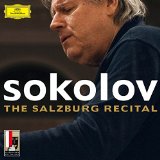
The Salzburg Recital: Grigori Sokolov
In a Class of His Own
He gives only about sixty recitals a year. In 1995, he stopped making studio recordings. He refused to perform in the U.K. in protest against its strict visa requirements for Russian citizens. Due to insufficient rehearsal time, he doesn’t play with orchestras. And he seldom gives interviews.
The Russian pianist Grigory Sokolov was born in Leningrad (St. Petersburg) in 1950. He gave his first major recital at the age of 12. At only 16, he won the prestigious International Tchaikovsky Competition in Moscow. Audiences around the world admire him for his virtuosity and originality. Experts rave about his voluptuous sound, precise articulation, supple phrasing and variety of touch. Many of them believe Sokolov invites comparison with legendary pianists of the past, such as Rachmaninov, Michelangeli, Horowitz or Richter. His recitals and recordings prove that there is no technical feat this bear of a man couldn’t accomplish on his Steinway. Had he lived in the Middle Ages, he would probably have been burned at the stake for sorcery.
On the CDs under review, Sokolov plays two Mozart sonatas in F major, K 280 and K 332 (Disc One), and Chopin’s 24 Préludes op. 28 with six encores (Disc Two). The entire recital, it should be stressed, was recorded live in the true sense of the word, i.e. in one take, without editing, splicing, mixing, or other tricks of the recording trade. In other words, what we hear on both CDs is what the audience heard at the recital. Refreshingly simple, isn’t it?
Grigory Sokolov’s Mozart is technically brilliant, intense in feeling, tender in expression and full of color. Still, it won’t be to everyone’s taste. The two Adagios, for example, sound much more romantic than in the hands of Mitsuko Uchida (Phillips), András Schiff (Decca) or João Pires (DG), not to mention Glenn Gould (Sony). Sokolov’s famous countrymen Vladimir Horowitz (DG) and Mikhail Pletnev (DG) take a similar view of Mozart, except that they are more lighthearted and playful in their approach. In short, superb as they are, these performances won’t replace the above-mentioned recordings.
Striking in their variety of style and mood, the Preludés are among the most difficult and forward-looking works Chopin wrote. Interestingly, Sokolov presents them not as a collection of self-contained poetic miniatures, but as one piece reflecting a kaleidoscope of moods and emotions. In this sense, he differs from other pianists, notably Alfred Cortot (EMI), Maurizio Pollini (DG) and Martha Argerich (DG). As for individual Preludés, sample the achingly beautiful No. 4, the nostalgic No. 15, the fiery No. 16, or the airy No. 23, and you’ll be left in no doubt that this is a truly imaginative performance by a great pianist.
The six short encores – Scriabin’s two Poèmes, Chopin’s two Mazurkas, Rameau’s tour de force Les Sauvages, and Bach’s choral prelude Ich rufe zu dir, Herr Jesu Christ – round off what must have been a magical evening in Salzburg.
© by Krzysztof Mąkosa
